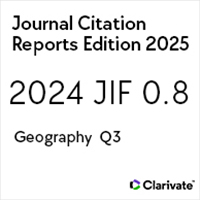The exception of the exception. The migration governance in pandemic times
La excepción de la excepción. La gobernanza de la migración en tiempos de pandemia
https://doi.org/10.21670/ref.2105068
Keywords:
Governance, migration, pandemic, MexicoAbstract
In this article we address the migration governance in Mexico in the context of the COVID-19 pandemic. The objective is to describe and analyze the functioning of this form of government, the relationship between the actors and the rationalities behind their actions, and the transformations that the pandemic has caused. We specifically analyze the first year of the pandemic through interviews with the actors of the migration governance taking place between July and October 2020. On the basis of the exceptional situation that puts in a special condition of visibility the complex structural framework of the migration governance in that it operates in the failure of the control mechanisms on the transit of the migrant population. We argue that the already exceptional situation of the governance the pandemic represents a new moment of exception given the restrictions that affect the object of this kind of governance: the mobility of populations.Resumen
En este artículo abordamos la gobernanza de la migración en México en el contexto de la pandemia de COVID-19. El objetivo es describir y analizar el funcionamiento de esta forma de gestión, las relaciones entre los actores y las racionalidades que los mueven, así como las transformaciones que la pandemia genera. Observamos específicamente el primer año de pandemia, a través de entrevistas con actores de la gobernanza entre julio y octubre de 2020. Partimos del supuesto de que esta situación excepcional pone en condición de especial visibilidad el complejo entramado de la gobernanza migratoria que opera sobre las fallas en los mecanismos de control de los medios de movimiento de la población migrante. Sobre esta situación, de por sí excepcional de la gobernanza, sostenemos que la pandemia representa un nuevo momento de excepción dadas las restricciones que afectan a aquello que la gobernanza gestiona: la movilidad de poblaciones.References
Agamben, G. (1998). Homo sacer. El poder soberano y la nuda vida. Pre-Textos.
Agamben, G. (2004). Estado de excepción: Homo sacer II, 1. Pre-Textos.
Agencia Reguladora del Transporte Ferroviario (ARTF). (2020). Sistema Ferroviario Mexicano [mapa digital]. http://artf.centrogeo.org.mx/mviewer/sfm
Alto Comisionado de Naciones Unidas para los Refugiados (ACNUR). (s. f.). Contacta al ACNUR. https://help.unhcr.org/mexico/donde-encontrar-ayuda/contacta-al-acnur/
Arendt, H. (1960). Freedom and politics: A lecture. Chicago Review, 14(1), 28-46. http://www.jstor.org/stable/25733551
Bauder, H. (2016). Migration Borders Freedom. Routledge. DOI: https://doi.org/10.4324/9781315638300
Betts, A. (2011). Global Migration Governance. Oxford University Press. DOI: https://doi.org/10.1093/acprof:oso/9780199600458.001.0001
Bourdieu, P. (1997). Razones prácticas: sobre la teoría de la acción. Anagrama.
Chignola, S. (2010). A la sombra del Estado, governance, gubernamentalidad, gobierno. En C. Altamira (Comp.), Política y subjetividad en tiempos de governance. Waldhuter Editores.
Comisión Mexicana para la Ayuda a Refugiados (Comar). (2020a). Estadística Octubre 2020. https://www.gob.mx/comar/articulos/estadistica-octubre-2020?idiom=es
Comisión Mexicana para la Ayuda a Refugiados (Comar). (2020b). ¿Dónde está Comar? https://www.gob.mx/comar/articulos/donde-esta-comar?idiom=es
De Certeau, M. (2000). La invención de lo cotidiano: Artes de hacer. Universidad Iberoamericana.
De Genova, N. (2002). Migrant “illegality” and deportability in every day life. Annual Review of Anthropology, 31, 419-447. https://doi.org/10.1146/annurev.anthro.31.040402.085432 DOI: https://doi.org/10.1146/annurev.anthro.31.040402.085432
Doering-White, J. (2018). Evidencing violence and care along the Central American Migrant Trail through Mexico. Social Service Review, 92(3), 432-469. https://www.journals.uchicago.edu/doi/10.1086/699196 DOI: https://doi.org/10.1086/699196
Domenech, E. (2018). Gobernabilidad migratoria: producción y circulación de una categoría de intervención política. Revista Temas de Antropología y Migración, (10), 110-118. https://ri.conicet.gov.ar/bitstream/handle/11336/93417/CONICET_Digital_Nro.5bd8f470-2f65-4f45-8a6c-68e354112a18_X.pdf?sequence=5&isAllowed=y
Fassin, D. (2007). Humanitarianism: a nongovernmental government. En M. Feher, Nongovernmental Politics (pp. 149-60). Zone Books.
Fassin, D. (2012). Humanitarian reason: a moral history of the present. University of California Press. DOI: https://doi.org/10.1525/9780520950481
Fassin, D. (2018). Por una repolitización del mundo. Las vidas descartables como desafío del siglo XXI. Siglo XXI.
Finkelstein, L. (1995). What is global governance? Global governance, 1(3), 367-372. http://www.jstor.org/stable/27800120 DOI: https://doi.org/10.1163/19426720-001-03-90000007
Foucault, M. (1980). La gubernamentalidad. En AA. VV. La microfísica del poder. Ediciones de la Piqueta.
Gatti, G. (2008). El detenido desaparecido. Narrativas posibles para una catástrofe de la realidad. Ediciones Trilce.
Gatti, G. (2017). Un mundo de víctimas. Antropos.
Gatti, G. (2020). The social disappeared: genealogy, global circulations, and (possible) uses of a category for bad life. Public Culture, 32(1), 25-43. https://www.researchgate.net/publication/338810741_The_Social_Disappeared_Genealogy_Global_Circulations_and_Possible_Uses_of_a_Category_for_the_Bad_Life DOI: https://doi.org/10.1215/08992363-7816281
Gatti, G., Irazuzta, I. & Martínez, M. (2021). Inverted exception. Ideas for thinking about the new disappearances through two case studies. Journal of Latin American Cultural Studies, 29(4), 581-604. https://doi.org/10.1080/13569325.2020.1839869 DOI: https://doi.org/10.1080/13569325.2020.1839869
Gatti, G., Irazuzta, I. & Sáez, R. (2020). Los no contados. Desbordamientos del concepto jurídico de desaparición. Athenea Digital, 20(3), 1-17. https://atheneadigital.net/article/view/v20-3-gatti-irazuzta-saez DOI: https://doi.org/10.5565/rev/athenea.2718
Gatti, G. & Irazuzta, I. (2019). Diario de la desaparición mexicana. Entre el precedente y el exceso. Disparidades. Revista de Antropología, 74(2). https://doi.org/10.3989/dra.2019.02.019 DOI: https://doi.org/10.3989/dra.2019.02.019
Global Detention Project. (s. f.). Mexico (country profile). https://www.globaldetentionproject.org/countries/americas/mexico
Guzmán, S. (2020). EU regresó a México 84 mil migrantes que solicitaron asilo en 2019. https://www.elfinanciero.com.mx/nacional/en-un-ano-estados-unidos-regreso-a-mexico-84-mil-migrantes-que-esperan-por-asilo/
Informe alternativo de las organizaciones de la sociedad civil de México al Comité Contra la Tortura en la ONU 2012-2019. (2019). http://cmdpdh.org/project/informe-alternativo-de-las-organizaciones-de-la-sociedad-civil-de-mexico-al-comite-contra-la-tortura-de-la-onu-2012-2019/
Informe sobre los efectos de la pandemia de COVID-19 en las personas migrantes y refugiadas. (2020). http://www.cmdpdh.org/publicaciones-pdf/cmdpdh-informe-migracion-y-covid-19.pdf
Instituto Nacional de Migración (INM). (2020). Actúa INM con responsabilidad ante la contingencia por COVID-19 (Boletín No. 125/2020). https://www.gob.mx/inm/prensa/actua-inm-con-responsabilidad-ante-la-contingencia-por-covid-19-241034#:~:text=Ante%20la%20emergencia%20sanitaria%20actual,a%20plenitud%20sus%20derechos%20humanos
Instituto Nacional de Migración (INM). (s.f.). Directorio. https://www.gob.mx/cms/uploads/attachment/file/454892/DIRECTORIO_Oficinas.pdf
Irazuzta, I. & Martínez, M. (Coords.). (2014). De la identidad a la vulnerabilidad. Bella Terra. DOI: https://doi.org/10.1387/pceic.12970
Kooiman, J. (1993). Modern governance. New government society interactions. Sage Publications.
Launay, C. (2005). La gobernanza: Estado, ciudadanía y renovación de lo político. Origen, definición e implicaciones del concepto en Colombia. Revista Controversia, (185), 92-105. http://bibliotecavirtual.clacso.org.ar/Colombia/cinep/20100925104922/lagobernanzaControversia185.pdf
Lippert, K. & Rehaag, S. (2013). Sanctuary practices in international perspectives. Migration, citizenship and social movements. Routledge. DOI: https://doi.org/10.4324/9780203128947
Mayntz, R. (2000). Nuevos desafíos de la teoría de Governance. Instituciones y Desarrollo, 7.
Mbembe, A. (2011). Necropolítica, seguido de sobre el gobierno privado indirecto. Melusina.
Médicos Sin Fronteras (MSF). (2020). Mapa ruta migrante. https://www.msf.mx/sites/mexico/files/-nuevo_map_ruta_migrante.pdf
Mezzadra, S. (2005). Derecho de fuga. Migraciones, ciudadanía y globalización. Traficantes de sueños.
Mezzadra, S. (2020). What happens to freedom of movement during a pandemic? Open Democracy. https://www.opendemocracy.net/en/can-europe-make-it/what-happens-freedom-movement-during-pandemic/
Mezzadra, S. & Neilson, B. (2013). Border as method, or, the multiplication of labor. Duke University Press. DOI: https://doi.org/10.2307/j.ctv1131cvw
Natera Peral, A. (2005). Nuevas estructuras y redes de gobernanza. Revista mexicana de sociología, 67(4), 755-791. http://www.scielo.org.mx/scielo.php?script=sci_arttext&pid=S0188-25032005000400004&lng=es&tlng=es
Negri, A. (2010). La soberanía, entre el gobierno, la excepción y la governance. En C. Altamira (Comp.), Política y subjetividad en tiempos de governance (pp. 333-360). Waldhuter Editore.
Ngai, N. (2005). Impossible subjects: illegal aliens and the making of modern America. Princeton University Press. https://www.jstor.org/stable/j.ctt5hhr9r
Oficina del Alto Comisionado para los Derechos Humanos (OACDH). (2018). Situación de los migrantes en tránsito. https://acnudh.org/situacion-de-los-migrantes-en-transito/
Organización Internacional para las Migraciones (OIM). (2015). Marco de gobernanza sobre la migración. https://publications.iom.int/es/system/files/migof_brochure_sp.pdf
Organización Internacional para las Migraciones (OIM). (2018). Directorio de casas y albergues para personas migrantes. https://kmhub.iom.int/sites/default/files/directorio_de_casas_y_albergues_para_personas_migrantes_digital_0.pdf
Organización Internacional para las Migraciones (OIM). (2019). Glosary on migration. International Migration Law, (34). https://publications.iom.int/system/files/pdf/iml_34_glossary.pdf
Organización Internacional para las Migraciones (OIM). (2020, noviembre). Tendencias migratorias durante la COVID-19 en Centroamérica, Norteamérica y el Caribe. https://rosanjose.iom.int/site/sites/default/files/Reportes/tendencias_migratorias_durante_la_covid-19_en_centroamerica_norteamerica_y_el_caribe_-_oim_.pdf
Olvera, A. (Comp.). (2001). La sociedad civil: de la teoría a la realidad. Colegio de México. https://www.jstor.org/stable/j.ctv6mtcjq DOI: https://doi.org/10.2307/j.ctv6mtcjq
Ong, A. (2006). Neoliberalism as exception. Mutations in citizenship and sovereignty. Duke University Press. DOI: https://doi.org/10.1515/9780822387879
Pérez-Agote, A. (1989). Sociología del nacionalismo. Servicio Editorial Universidad del País Vasco.
Pierre, J. (2000). Introduction: understanding governance. En J. Pierre (Ed.), Debating Governance (pp.1-10). Oxford University Press.
Porras, F. (2007). Rethinking local governance: hierarchies and networks in Mexican cities. European Review of Latin American and Caribbean Studies, 83, 43-59. https://www.jstor.org/stable/25676280?seq=1 DOI: https://doi.org/10.18352/erlacs.9632
Powell, W. & DiMaggio, P. (1991). The new institutionalism in organizational analysis. University of Chicago Press. DOI: https://doi.org/10.7208/chicago/9780226185941.001.0001
Sassen, S. (2006). Territory, authority, rights: from medieval to global assemblages. Princeton University Press. https://www.jstor.org/stable/j.ctt7sx98
Schindel, E. (2020). Desiertos, mares, islas: geografías de intemperie como espacios de desaparición en contextos migratorios. Papeles del CEIC, 2020(1), 1-16. https://addi.ehu.es/bitstream/handle/10810/47200/20909-83078-1-PB.pdf?sequence=1&isAllowed=y DOI: https://doi.org/10.1387/pceic.20909
Schmitt, C. (2009). Teología política. Trotta.
Shapiro, M. (2001). Administrative law unbounded: reflections on government and governance, Indiana Journal of Global Legal Studies, 8(2), pp. 369-377.
Shoemaker, K. (2013). Sanctuary for crime in the early common law. En R. Lippert & S. Rehaag, International perspectives. Migration, citizenship and social movements. Routledge.
Slack, J. (2019). Deported to death how drug violence is changing migration on the US-Mexico border. University of California Press. DOI: https://doi.org/10.1525/9780520969711
Torpey, J. (1998). Coming and going: on the state monopolization of the legitimate “means of movement”. Sociological Theory, 16(3), 239-259. http://www.jstor.org/stable/202182 DOI: https://doi.org/10.1111/0735-2751.00055
Torpey, J. (2020). La invención del pasaporte. Estado, vigilancia y ciudadanía. Cambalache.
Urry, J. (2007). Mobilities. Polity.
Varela, A. (2019). Capitalismo caníbal: migraciones, violencia y necropolítica en Mesoamérica. En B. Cordero, S. Mezzadra & A. Varela (Coords.), América Latina en movimiento. Migraciones, límites a la movilidad y sus desbordamientos. Traficantes de sueños.
Varela, A. (2020). Necropolítica y migración en la frontera vertical mexicana. Un ejercicio de conocimiento situado. UNAM. http://ru.juridicas.unam.mx/xmlui/handle/123456789/58574
Washington, J. (2020). The dispossessed. A story of asylum at the US-Mexican border and beyond. Verso.
































